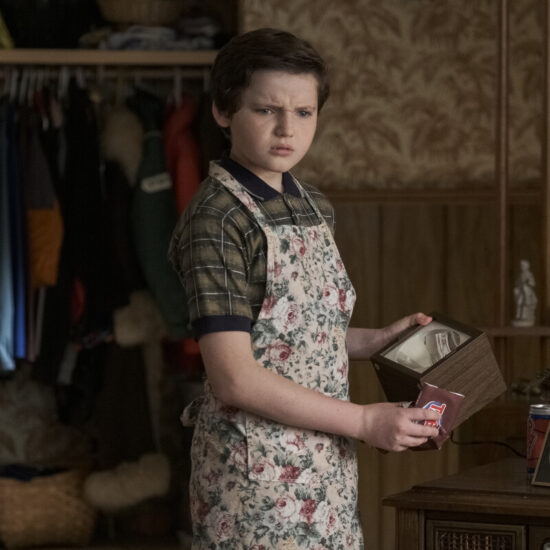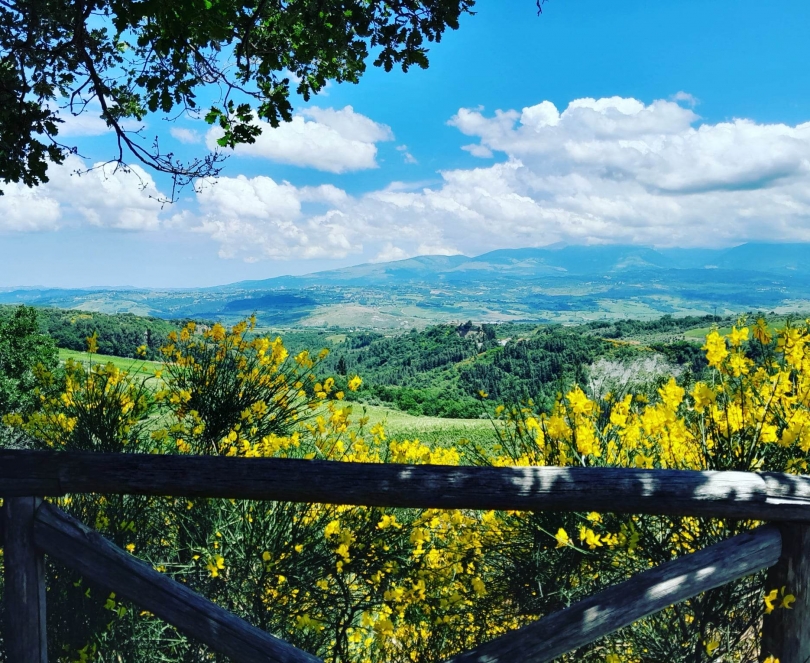
Italy is without question one of the most beautiful and romantic countries in the world, celebrated in some of cinema’s most iconic films, Roman Holiday (the first ever Hollywood movie made in Italy), La Dolce Vita, The Godfather, Il Postino, and Under the Tuscan Sun. Most recently, the hit series White Lotus, set in Toarmina, showcased the picturesque landscape of Sicily. Incidentally, my research has revealed that some of the most stunning scenery of Abruzzo has been captured on the big screen in such titles as The Name of the Rose starring Sean Connery, The American starring George Clooney and my personal favorite, Ladyhawke with Rutger Hauer and Michelle Pfeiffer, filmed at the castle of Rocca Calascio.
.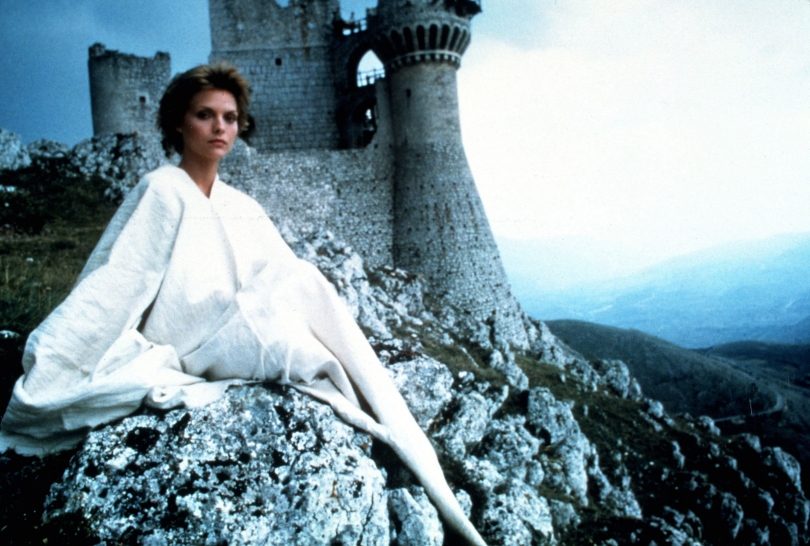
Michelle Pfeiffer in Ladyhawke
Recently, a group of journalists and influencers were invited to experience the magical wine country of Abruzzo – the provinces L’Aquila, Teramo, Pescara and Chieti – still rather unexplored but sure to be one the most sought after destinations for wine tourism and film locations soon.
The wines of Abruzzo are made with red grapes, mainly Montepulciano, with white grapes typically the Trebbiano, Pecorino and Passerina varietals, grown in the lush clay soil with salty winds off the coast of the Adriatic Sea. The area is well known for its Italian rosé called Cerasuolo, which really should be distinguished from the more well known rosés of Provence. I would like to suggest to re-brand the wine, made mainly from Montepulciano grapes, as ‘ruby rosé’ to describe its velvety deep red hues.
On my recent visit, we took daytrips to some of the region’s finest wineries and vineyards. Like in our favorite films, the stories of the families behind the Abruzzo wineries made our sojourns even more special.
Scene One… Fontefico Winery: The Artistry of Wine
Fontefico Winery is an organic farm that cultivates exclusively native vines and produces wines on the Gulf of Vasto.
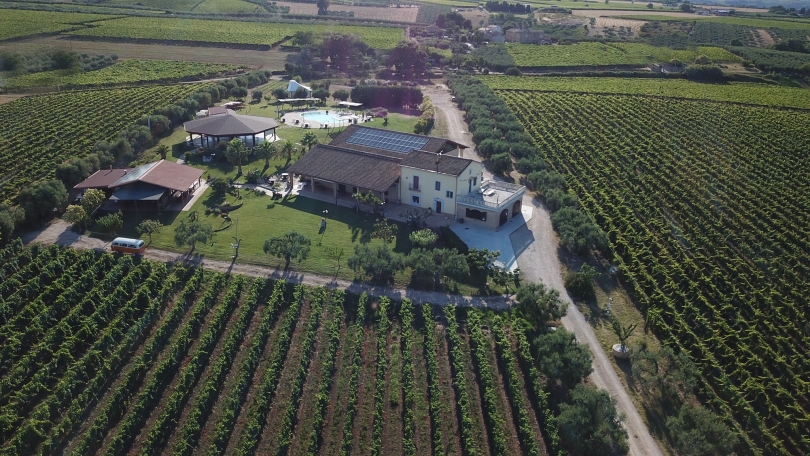
The Altieri family purchased the property in 1996 to produce grapes, but sons Emanuele and Nicolo had other plans. The siblings wanted to create the family winery and bottle their own wines. After 10 years of experimentation in the winemaking process, the first wines were ready in 2006, Each wine, grown from a single and specific vineyard, has its own special identity, name and label created by artist Nicola, newly designed each year to reflect that year’s vintage.
Pecorino Superiore is “the rogue” because the vineyard is mischievous and does not let itself be tamed but is then forgiven with a superlative wine. Trebbiano Superiore is the “Portarespect”, because this vineyard has seen many harvests throughout its history, welcoming its grapes with love and respect. Montepulciano d’Abruzzo is the “Cocca of the house,” made with the region’s favorite grape. Each year the labels are designed “to tell an anecdote of that specific harvest and the history of Fontefico.”
Today, visitors can enjoy the family’s hospitality in various ways, from taking The Fontefico Experience, a wine tasting and elaborate lunch, or a cooking class, and some lucky guests can hold their special events at the beautiful property, however, the family only takes on a few events each year. Altiera matriarch and her team (it’s all in the family) made the most delicious lunch of our tasting, featuring the specialties of the region, local charcuterie and cheeses, stuffed rolled eggplant, and spaghetti alla chitarra. The winemakers are passionate about their wine and hope to infuse “a bit of Abruzzo in each bottle.”
Scene Two… Castorani 1793: A Famous Family Affair
Located in Alanno, a small town in Pescara in the heart of the Casauria territory, Castorani 1793 stands 350 meters above sea level, nestled between the Majella National Park and the nearby Adriatic coast. A unique mix of modernity and tradition, a ultra modern structure that houses offices, guest tasting rooms, a profession kitchen, event space and an underground winery (that keeps things naturally cool), stands next to the historic Villa Castorani, which origins date back to 1793. Plans are in the works to refurbish and renovate the ancient structure, transforming it into a boutique hotel.
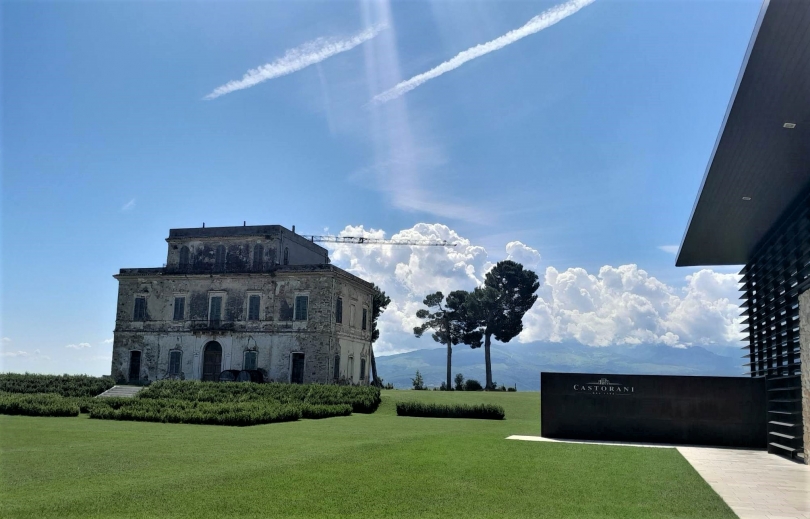
Owned over the years by some illustrious figures, the property was divided and the villa was abandoned in the 1970s until 1999, when an ambitious group of friends reunited the plots. The current owners are the Cavuto family and the family of the famous Formula 1 champion Jarno Trulli. (In fact, upon entering the main structure’s lobby, the first thing you’ll see is an authentic Formula 1 race car.) The partner families are very involved in all aspects of business, from the management and production, to testing and innovation, to the brand’s promotion and marketing. Dedicated to upholding traditional Italian winemaking methods such as the use concrete vats, the owners also incorporate the latest innovations, to achieve the finest product. Guests are invited to stop by for a guided tour by oenologist Angelo, who will share the secrets of the production of these wonderful wines
Scene Three… Cantine Mucci: History Meets Passion
An historical family of the region, the wine journey of the Mucci family began in 1895 when Luigi Mucci, after graduating in oenology from the Royal Agricultural Institute, began his lifelong work on the cultivation of vines production of wine. The winery has remained in the family to this day, with the latest generation Aurelia and Valentino, who remain dedicated to the family’s passion for winemaking, following in the footsteps of their father Nicola, grandfather Valentino, and great grandfather, Tommaso (son of Luigi).
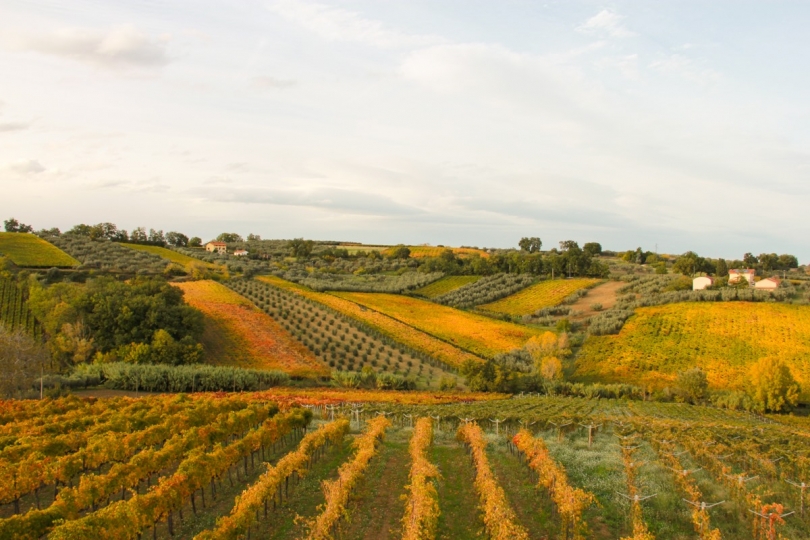
In 1996, Cantine Mucci’s image was revamped and the range of wines produced was expanded with the help of consultant Dr. Oenologist Leone Cantarini. Today, the property sits on 20 hectares of which 16 are vineyards, all situated on the hills around Torino di Sangro. Its cellar produces almost exclusively farm grapes, including Montepulciano d’Abruzzo, Cabernet Sauvignon, Merlot, Sangiovese, Trebbiano d’Abruzzo, Pecorino, as well as Falanghina, which may in fact be the oldest vine in the world, cultivated in Roman times
Our tour of the vineyards and property culminated with a tasting of the riches of the area, (charcuterie, ricotta balls, pasta, etc.), in the stunning rooftop dining area overlooking the property.
Scene Four… Pasetti Winery: Italian Passion
On my final stop in Abruzzo before returning to Rome, we visited Pasetti Winery and guest house Tenuta Testarossa in the village of Pescosansonesco, inside the National Park of Gran Sasso and Monti della Laga. The mainly uphill drive on a narrow, winding road to reach the property was quite a story in itself, but I’ll save that for another day.The visit was truly special. Learning about the five generation, family owned winery, today lead by the passionate entrepreneur Domenico (Mimmo), wife Laura, and their three children, Francesca Rachele who is in charge of administration, oenologist Davide and Massimo, who handles of business and export operations.
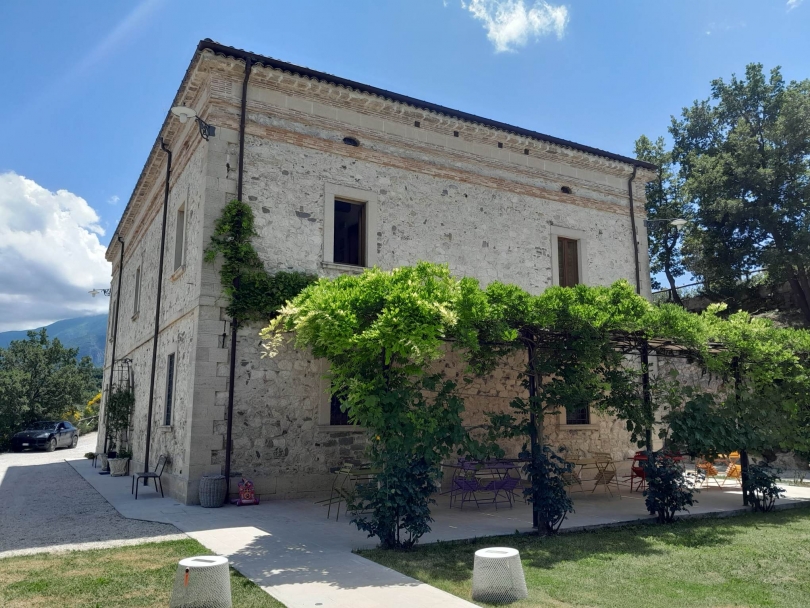
The winery started vinification of its own in the 1960s, and in the 80s, Mimmo after studying enology, ventured to bottle its Montepulciano. Thus, in celebration of his first born Francesca, redheaded like his Donna Rachele, Testarossa Rosata, the crown jewel of the winery’s offerings, was born. Eventually the forward-thinking patriarch added more fields from the Gran Sasso and Monti della Laga National Park areas, beginning the transformation from the coast to the mountains of Abruzzo, with its alpine climate and deep clay soil. Pasetti Winery is the only company in Italy allowed to exhibit the National Park logo in the back of its bottles. “The wine is a life experience, not an exact science.” – Mimmo Pasetti
Matriarch Laura, the most welcoming hostess, prepared an expansive, homemade meal of local specialties to accompany our tasting. She also made sure we didn’t leave empty handed. Before departure, she served her guests delicious sweets and their fragrant sweet Gesmino, made with Moscatello di Catiglione grapes, and then presented each guest with vacuum-sealed, generous portions of decadent guanciale (which she had served in a pasta dish earlier) to take back home with us.
The Abruzzo region boasts over 250 wineries. During my visit, we only were able to experience in depth the riches of only a handful of the area’s incredible properties, as well as sample the wines of the region at a special Grand Tasting Vini d’Abruzzo 2023 event held at the beautiful estate Tenuta Coppa Zuccari. Looking forward to my next visit, to uncover and discover more real stories of the inspiring families behind the wines.
The Abruzzo region boasts over 250 wineries. During my visit, we only were able to experience in depth the riches of only a handful of the incredible properties, as well as sample the wines of the region at a special Grand Tasting Vini d’Abruzzo 2023 event at Tenuta Coppa Zuccari.
There is so much more to do and see in Abruzzo, from visiting the trabocchi (fishing machines on wood platforms on the water) along the coast or the ancient Abbey of San Giovanni in Venere, to exploring the historic town of Vasto, or simply spending a day relaxing day by the sea in Silvi Marina. (Our seafront base, the Hermitage Hotel Club & Spa is the perfect location for a beach holiday.) Looking forward to my next visit, to uncover and discover more real stories of the inspiring families behind the wines, and to explore more of this magical region of Italy.
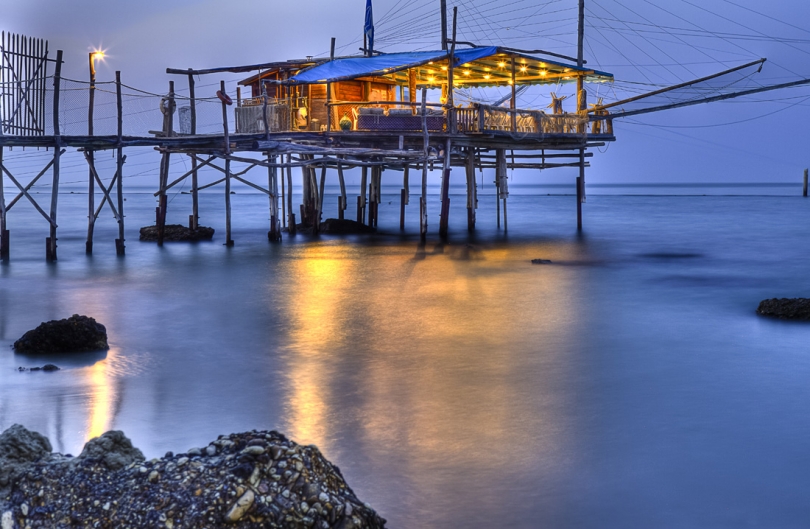
To discover more about Abruzzo’s wine tourism, visit www.abruzzowineexperience.com
Home page | Film Commission Abruzzo (regione.abruzzo.it)
Special thank you to I.E.E.M. (International Event & Exhibition Management) and Consorzio Tutela Vini d’Abruzzo. @ieemusa @vinidabruzzo\












